The first time that you see your little one be mean to animals, it’s usually in their toddler years. They simply don’t know it’s not okay to pull the cat’s tail. Once your child gets older, it becomes disturbing.
You see that your child is being cruel to animals and you can’t help but wonder whether you’re raising a tiny serial killer. After all, doesn’t it all start that way when they’re children. Thankfully, you’re more than likely not raising a serial killer.
My youngest daughter is not biologically mine. She suffered quite a bit of trauma and used to hurt animals. She no longer does, but I do understand how tough that road can be.
So, we’re going to go over everything together, from what could be causing that behavior all the way to how you can help them get back on the right track.
Keep in mind that I’m going to include some of the lesser common reasons, like mental illnesses. That doesn’t mean that your child has them.
This article is based on my opinion and should not be used as a substitute for professional advice from a licensed professional.
Reasons Why Your Child Might Be Hurting Animals (And What You Can Do)
There are quite a few reasons why your little one could be hurting animals. Perhaps they’ve been abused and are re-enacting the abuse via the new cat? Maybe they are imitating what they have seen someone else do to an animal?
On the other hand, maybe they will grow up to be in jail for various crimes. It can be hard to tell whether you should be alarmed or not.
The key to knowing whether this is a huge red flag or normal behavior is being able to identify the cause behind the cruelty.
Mental Illness
The primary mental illness that we think of when we imagine a child hurting animals is sociopathy, but that isn’t the only mental illness that can result in a child being cruel to the family pet.
View in gallery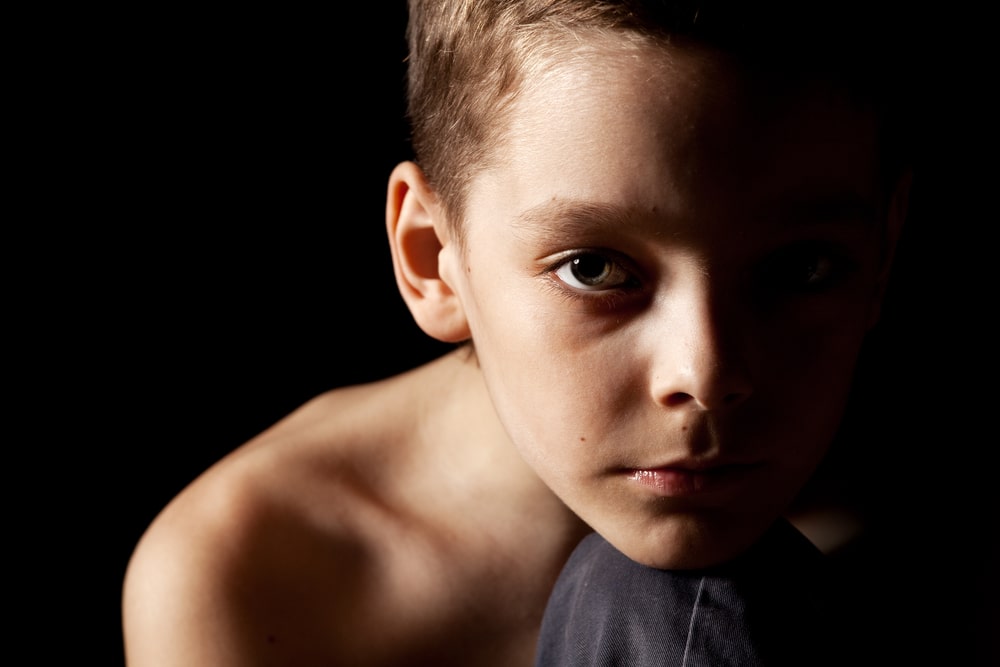
Depression
When a person, including a child, has depression it can cause quite a few symptoms. Depression is known for causing irritation and aggression. Pets might be a way to release that aggression.
A child may also have a difficult time controlling their irritation, which can lead to them snapping and hurting an animal if it bothers them.
Depression is known for causing a lack of feelings. Children feel almost numb. This can make the boredom that many experiences in childhood worse. Hurting animals can provide an instant emotion.
PTSD
Post Traumatic Stress Disorder is common among children that have experienced a traumatic event. This can make a child feel like they are in danger, even though they are not.
Often, their first reaction is to protect themselves. Their brain goes into survival mode, invoking the fight or flight response. This can result in them attacking an animal that they feel is a threat to them.
Conduct Disorder
This is a personality disorder that is marked by several disturbing behaviors that show a complete disregard for others, often including animals.
For a child to have conduct disorder, they must be intellectually capable of understanding the impact of their actions. Other symptoms of conduct disorder also include, but are not limited to:
- Setting fires (arson)
- Other destructive behavior, such as vandalism
- Other aggressive behavior
- Violating rules, such as running away (this is often more than a one-time incident)
- Shoplifting, stealing from family, lying, and other behavior that can be described as deceitful
Trauma
[amalinkspro type=”showcase” asin=”1938113675″ apilink=”https://www.amazon.com/dp/1938113675?tag=mominformedcom-20&linkCode=osi&th=1&psc=1″ new-window=”true” addtocart=”false” nofollow=”true” sc-id=”5″ imgs=”LargeImage” link-imgs=”false” btn-color=”#ff9900″ btn-text=”Check Price” alignment=”aligncenter” hide-prime=”0″ hide-image=”0″ hide-price=”0″ hide-button=”0″ width=”500″]Trauma and Young Children: Teaching Strategies to Support and Empower[/amalinkspro]
When children are traumatized, it can affect them in a variety of ways. There are several ways that trauma can result in a child hurting animals.
Children Might Re-Enact Trauma They’ve Experienced
Children that have been abused and neglected are more likely to treat other people and animals that way. For example, if a child was punched they might punch the family dog. They are treating animals in ways that they have been treated.
PTSD Symptoms
Often, children will display symptoms of PTSD long before they are diagnosed with PTSD. PTSD symptoms that persist will then be diagnosed as PTSD. These symptoms result in a child feeling scared and hurting the animal to protect themselves.
Being Exposed To Violence
Numerous studies have linked children abusing animals to children being exposed to violence. They may have been abused themselves, or they may have witnessed domestic violence in the home. Both of these can lead to a child hurting animals.
This link could be for various reasons. It could be children imitating what they have seen. Another reason may be that children develop a tendency towards violence due to their environment.
The best way to deal with this is to make sure that your little one is not exposed to violence. If there is domestic violence in the home, get help immediately. Children that have been abused need to be taught how to be nice to animals and work through their trauma with a trained professional.
Needing A Sense Of Control
When children are traumatized, they can want to feel in control of something. This can be seen in defiant behavior. It’s also seen in trying to control other people (bullying) and trying to control animals.
Children often feel that because they can’t control the events that happened to them, they want to control other things.
However, it’s important to not give your child too much control. Abuse is never okay. Instead, consult a professional.
While you’re waiting to get in for your first appointment, try giving them more control over everyday things, such as picking out what clothes they wear for the day.
Normal Reasons
View in gallery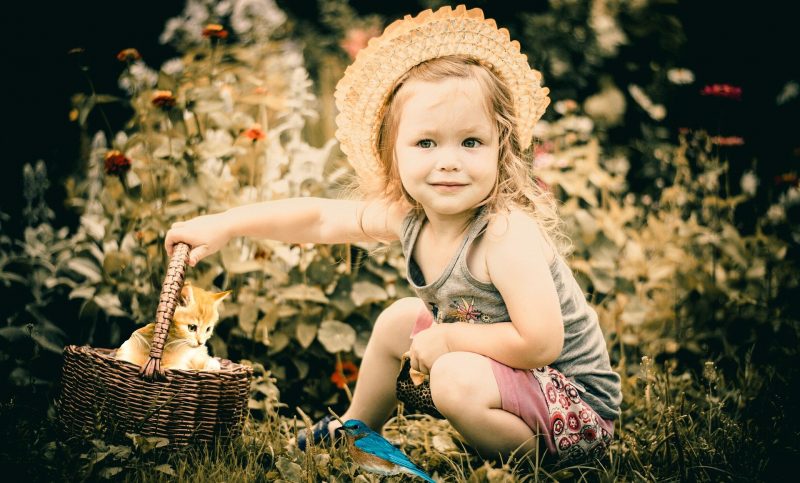
Although some children have personality disorders or trauma that can cause them to hurt animals, others might be hurting animals for perfectly normal reasons. This is seen frequently in young children or those that are developmentally delayed.
Children Can Accidentally Hurt Animals If They Are Curious
When children are curious, they can easily hurt animals. This is very common in children that are younger or those that are developmentally delayed. They honestly do not know any better.
Most children that are younger have yet to develop the understanding that animals, like people, have feelings and can be hurt. Instead, they view them as toys.
Once you realize how rough your child is with their toys, it can make sense that they can accidentally hurt an animal.
If your child is young or developmentally delayed, and accidentally hurting animals, it’s important to continuously teach them how to play with animals without hurting them. This can involve a lot of repetition.
Peer Pressure
Some children might hurt an animal because other kids are peer-pressuring them to do so.
They might encourage a small child to pull an animal’s tail or throw a puppy. This can also convince young children that hurting animals is appropriate.
Make sure that you pay close attention to your child, and who they are around. Listen when they play with other children to make sure that there is no peer pressure or encouragement of inappropriate behaviors.
View in gallery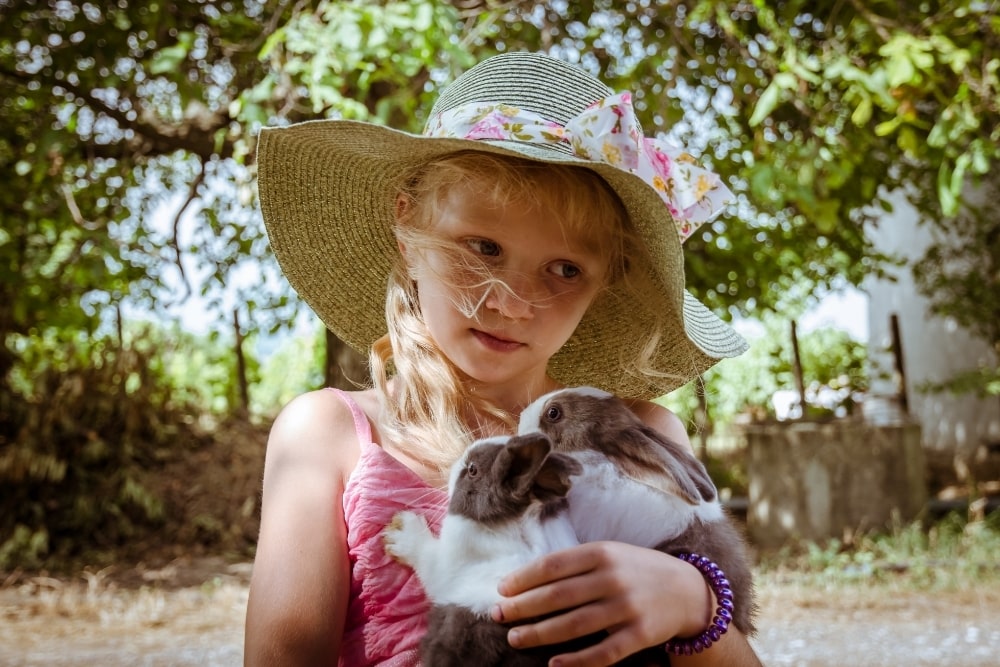
They’re Trying To Help The Animal
When a child has a strong attachment to an animal, they might not be able to stand to watch the animal suffer.
This can lead to them wanting to essentially put the child out of its misery. It’s simply because they do not know of another solution to help the animal.
They Have A Phobia Of The Animal
When a child has a phobia of a certain animal, they assume that the animal is going to hurt them.
We see this in everyday life in so many people being scared of spiders. This leads to people killing spiders even if the spider is not going to harm them.
Children that have a phobia of another animal, such as cats or dogs, might also try to hurt the animal. They are hurting the animal because they are trying to protect themselves from the animal.
Attention-Seeking Behavior
When our little one’s attention cup isn’t quite full, they will try to find ways to get attention. This can include behaviors like throwing tantrums, breaking things, and even hurting animals.
If you act shocked or give them attention when they hurt the cat, they’re happy to get that attention. Remember, negative attention is better for a child than not getting any attention.
What Do I Do If My Child Is Hurting Animals?
View in gallery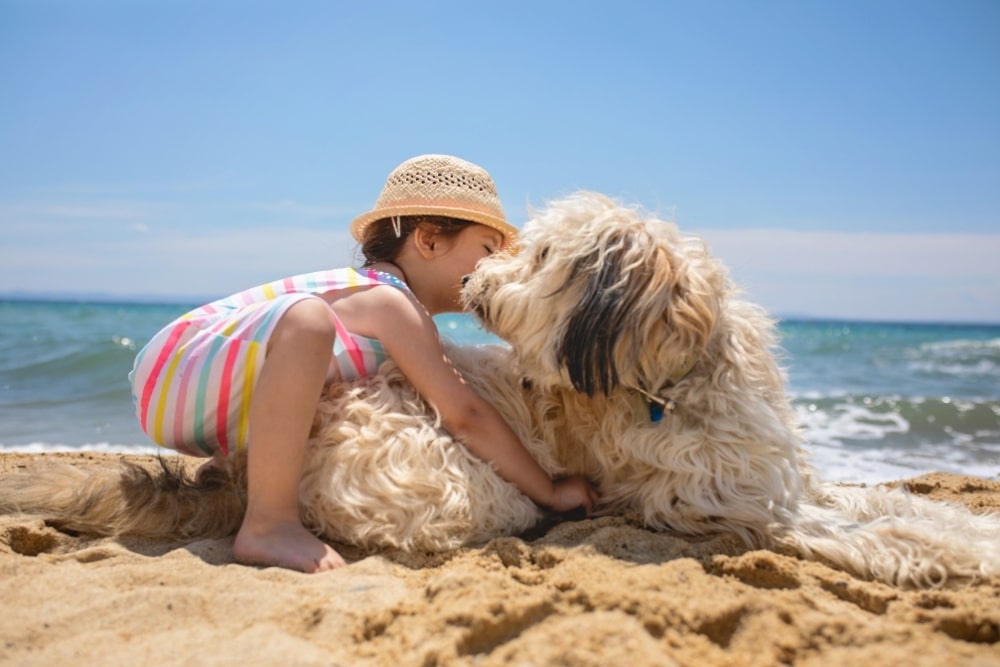
If your little one is hurting animals, you’re bound to be filled with a range of emotions. You might be scared of what your child’s future looks like.
It’s common for parents to be concerned about the family pet as well. Fortunately, there are quite a few things that you can do.
Consider Your Child’s Age Before Acting
Before assuming that your child has something like conduct disorder, it’s important to take their age into consideration. Children hurting animals is considered normal for young children.
Ages 1-6
At this age, children might not understand that they are hurting a pet. They are more likely to accidentally hurt a puppy by squeezing them too hard, for example. Some children genuinely don’t understand that pets are any different than toys.
What To Do If Your Child Is Hurting Animals And Under The Age Of 6
When your little one is hurting animals and has not been traumatized or exposed to violence, you can usually assume that this is normal for them.
However, it’s best to consult your pediatrician to make sure that your child’s behavior falls into the normal age range.
If it does, you simply need to work on compassion and empathy. Practice being nice to animals with your little one.
Children that fall into the older ages in this category can understand it when you tell them that something hurt the kitty and that a kitty doesn’t like to play rough.
Over time, they will slowly get the hang of things. It does take time and practice, though.
Ages 6/7 And Above
Children that are on the lower end of this age range might be still learning that they can hurt an animal. Children in the middle age group are more than likely able to understand that they are hurting the animal.
They could be doing this for attention, feel in control, or simply because they lack empathy. Older children are more than likely to be engaging in other anti-social behaviors, such as stealing or abusing drugs.
View in gallery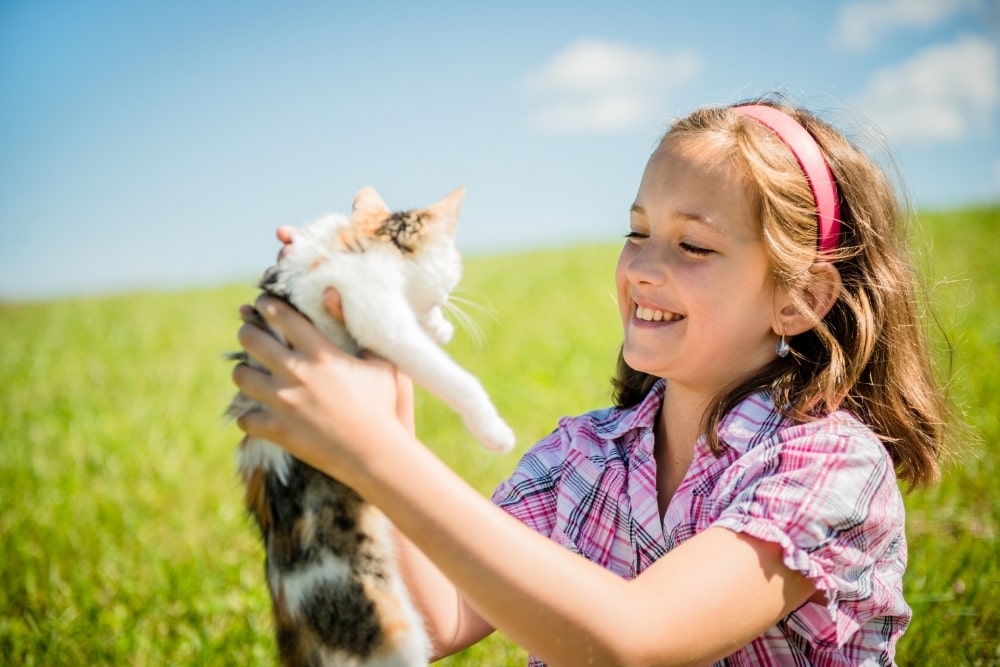
What To Do If Your Child Is Being Cruel To Animals And Older Than Six
If your child is being mean to animals and understands what they are doing, it’s important to consult a professional.
A psychiatrist or therapist can help you understand the underlying cause behind your child’s behavior. They can also give you helpful tips to steer your child in the right direction so that they are able to thrive as an adult.
When Should I Be Concerned?
You should be concerned if you feel that your child understands that they are hurting an animal and continues to do it.
When it appears that your little one derives pleasure from hurting others, including animals, it can be cause for concern.
Children that have other concerning behaviors, such as setting fires, destructive behaviors, etc. alongside hurting animals need professional help, even if they are younger than six.
Always Seek Professional Help If You Are Concerned
If you’re concerned about your child, you should always seek professional help. It’s better to be safe instead of sorry. Younger children and parents can often benefit from having a therapist.
These professionals can help children learn important lessons and can help parents learn the most effective parenting method to teach things to young children.
What worked for one child might not work for another one, so it can be helpful to have outside input.






